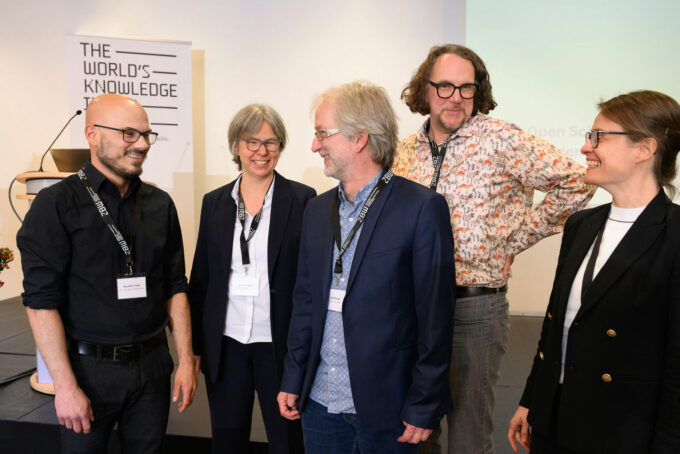
Open Economics: Study on Open Science Principles and Practice in Economics
There is wide agreement with the principles of Open Science in economics. This is shown by a ZBW study. However, there is still room for development regarding the implementation of Open Science on a broad basis, and a high requirement for support regarding Open Science practices.
by Guido Scherp and Doreen Siegfried
The degree to which different scientific disciplines are permeated by Open Science practices still varies enormously. Every discipline or community needs to find its own specific approach as to how the implementation of Open Science can succeed. For example, in economics it’s possible to observe that, owing to a „credibility revolution“, empirical research and thereby the role of research data has become a significantly higher priority in recent years. The COVID-19 pandemic is currently revealing how important open and collaborative approaches are in designing research to be more efficient and trustworthy as well as disseminating research results faster.
The ZBW – Leibniz Information Centre for Economics plans to reinforce the respective endeavours of the Open Science movement as well as focus its services for supporting Open Science better towards the needs of economists. The ZBW has therefore carried out the study “Die Bedeutung von Open Science in den Wirtschaftswissenschaften” (German) to get an overview of the role Open Science currently plays in the everyday working lives of economists.
The field phase took place at the end of 2019. The evaluation is based on 300 of the questionnaires, which have been answered at German higher education institutions and research institutes.
High level of agreement with the principles of Open Science
Four out of five economic researchers have already heard of the term ‘Open Science’. Furthermore, there is wide agreement with the general principles of Open Science. For example, 96 per cent of those questioned agreed with the statement that the replicability of research results is an important quality criterion for increasing the credibility of science. A similarly high 91 per cent agree with the statement that the results of publicly financed research should be made freely available. Overall, there were agreement ratings of 85 to 96 per cent; only the inclusion of societal stakeholders in research processes (community science/citizen science) was agreed with by only 56 per cent.
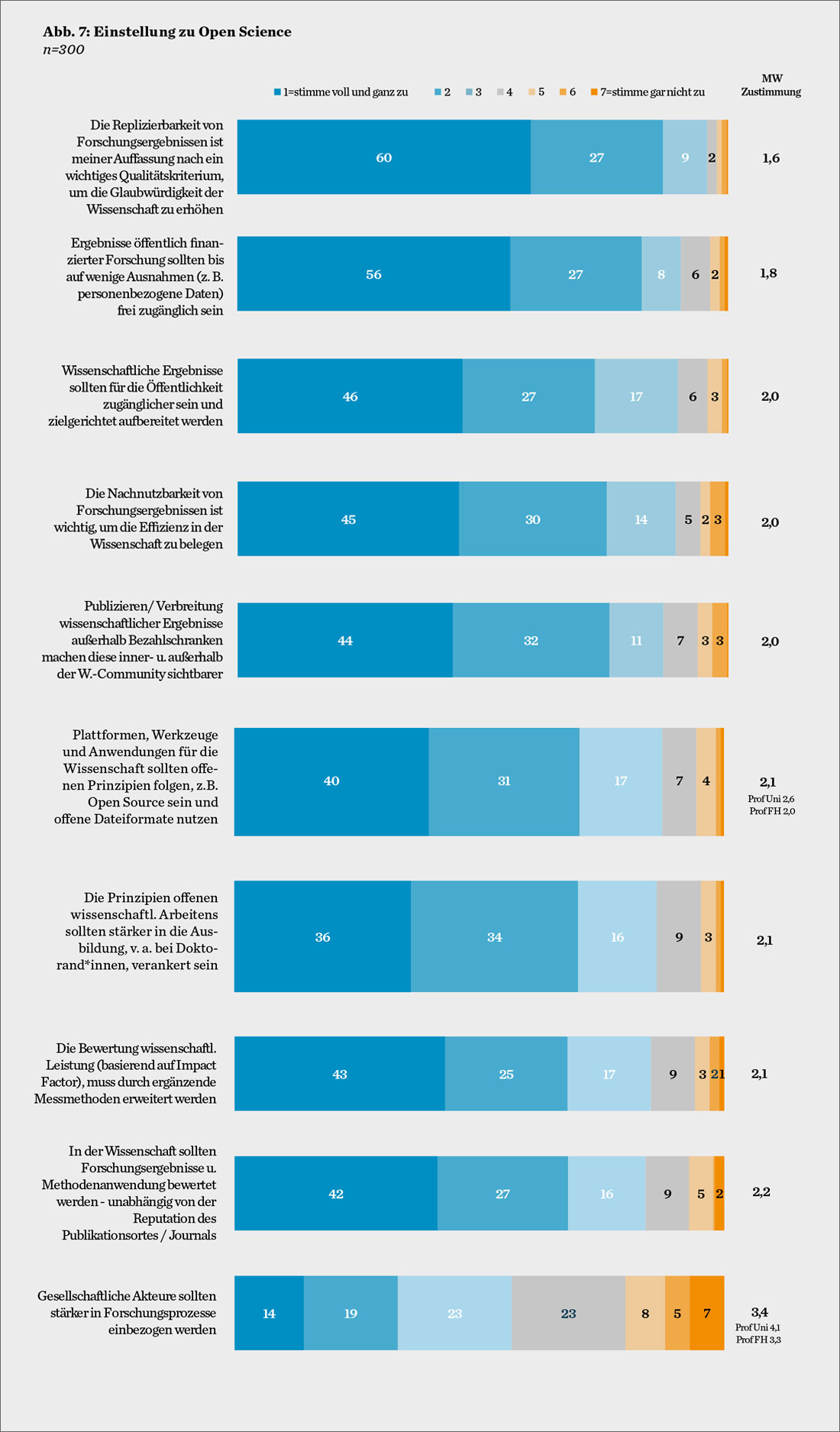
Open Science practices are not yet applied in a broad sense
Asking about the general role of Open Science practices in everyday research, open source (64 per cent) and Open Access (62 per cent) play a fairly important to very important role. Community Science/Citizen Science (14 per cent) and Altmetrics (8 per cent) play the smallest role. The high rating for Open Source is interesting: perhaps it correlates with a high user intensity of Open Source solutions.
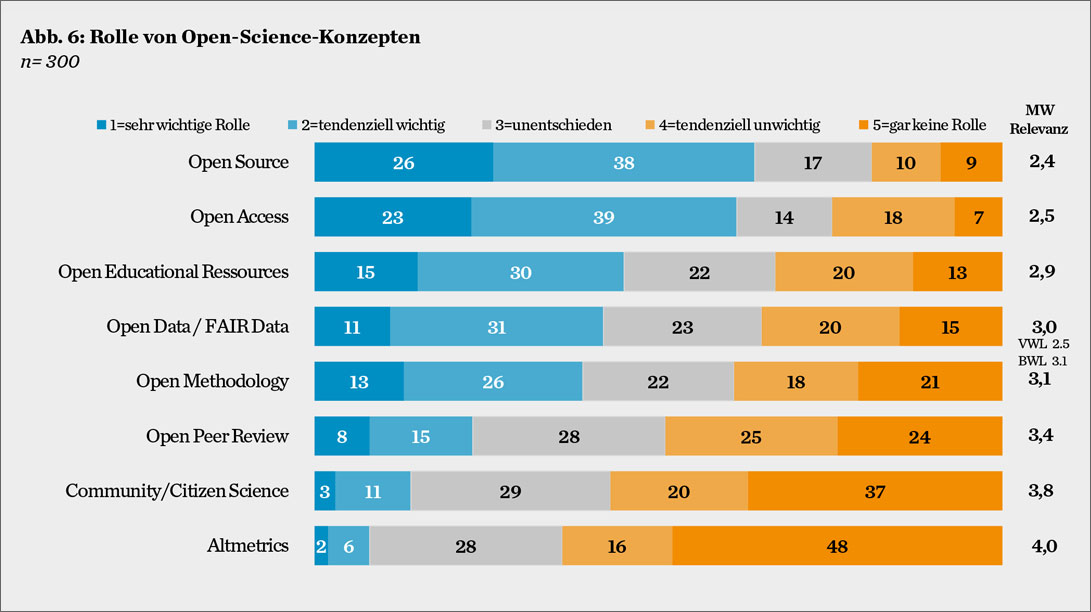
Asked more concretely, 34 per cent of all economists stated that they have already published in Open Access; for 61 per cent it was a working paper in a repository and for 59 per cent it was an Open Access journal. The prominence of Open Access journals is rather surprising because the percentage of pure Open Access journal in economics is still small. University professors publish significantly more frequently (59 per cent) in Open Access than research assistants (24 per cent). Other studies also confirm that research assistants focus more strongly on their academic careers and tend to publish in journals with a high impact factor rather than in Open Access journals.
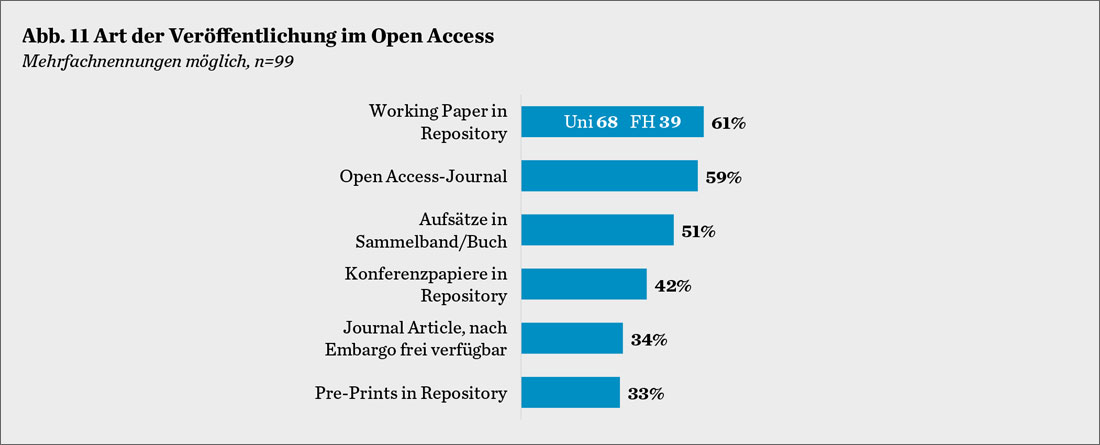
78 per cent of all economists work with research data. 56 per cent of them use the data from others and 51 per cent use free software for data analysis (this correlates with the significant role of open source, see above). 44 per cent have already appendixed/linked a publication with corresponding research data. Only 15 per cent have made plain data accessible via a repository.
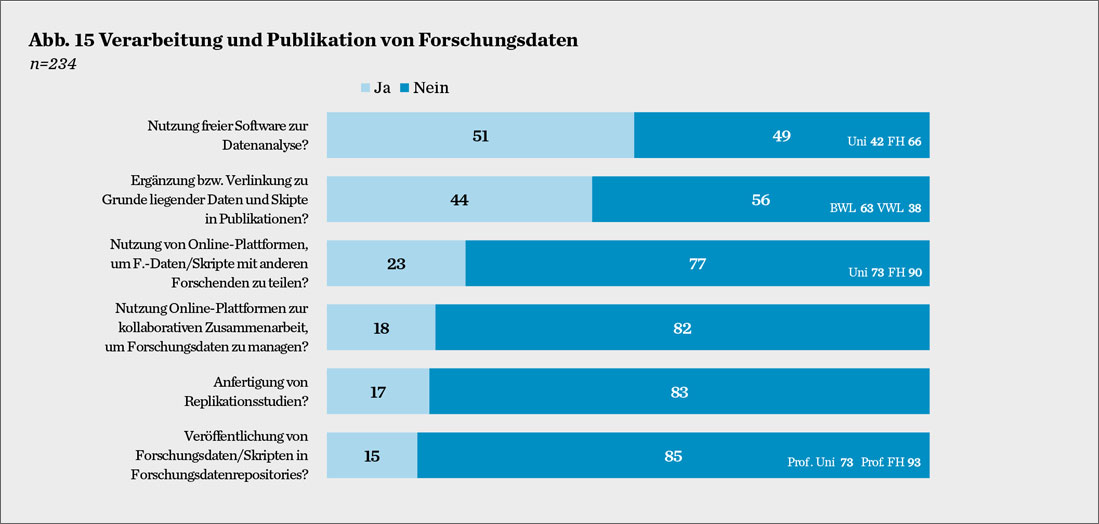
Reputation and time are central factors
Other studies have already shown that reputation and recognition are central triggers for Open Science. Time also plays an important role. The most frequently quoted obstacles to using Open Science practices were thereby a lack of time (43 per cent), of support (32 per cent) or of recognition in the community (30 per cent).
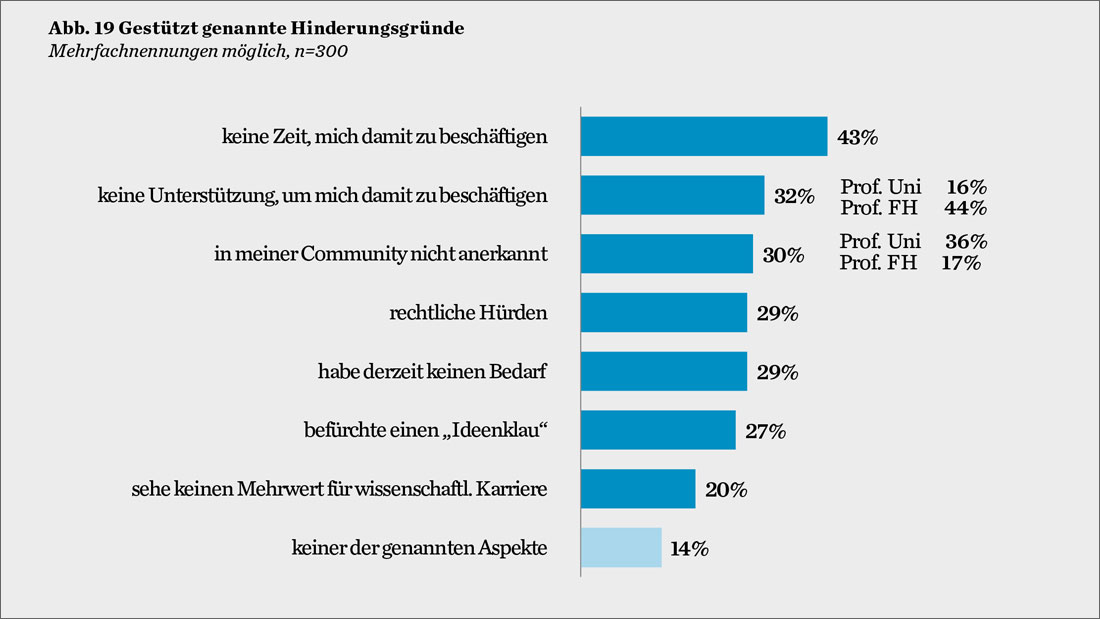
Asked about incentives, aspects concerning reputation and recognition are dominant. Incentives mentioned were:
- researchers/lay persons would be more interested in the paper (54 per cent),
- citations increase with Open Access (52 per cent),
- the application is acknowledged in science (51 per cent),
- and there are citations for published data (49 per cent).
Recognition in the scientific community thereby plays a more important role for research assistants (63 per cent) than for professors (39 per cent).
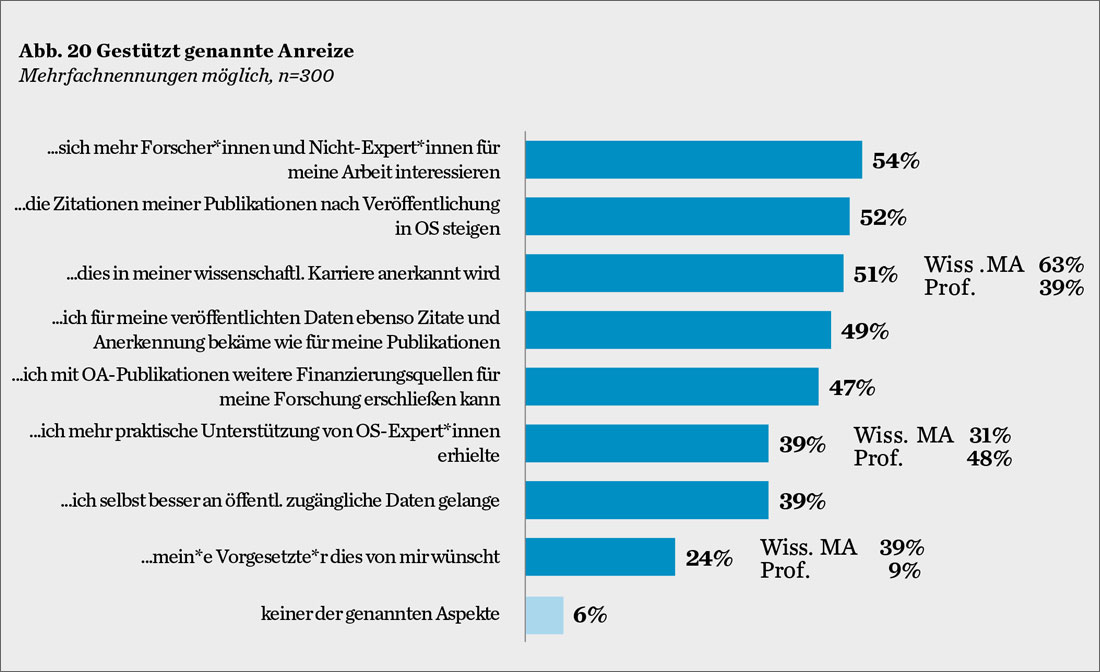
High need for support
In general, economists have a great need for support when it comes to the implementation of Open Science. This ranges from an overview of platforms, tools and applications (84 per cent) to the support for an improved replicability of own research results (50 per cent). Beneath this, the lowest rating: 40 per cent of those questioned would like support in incorporating societal stakeholders (Community Science/Citizen Science). This topic also played the least important role in everyday research (see above). Professors at technical colleges seem to have a higher requirement for support than university professors.
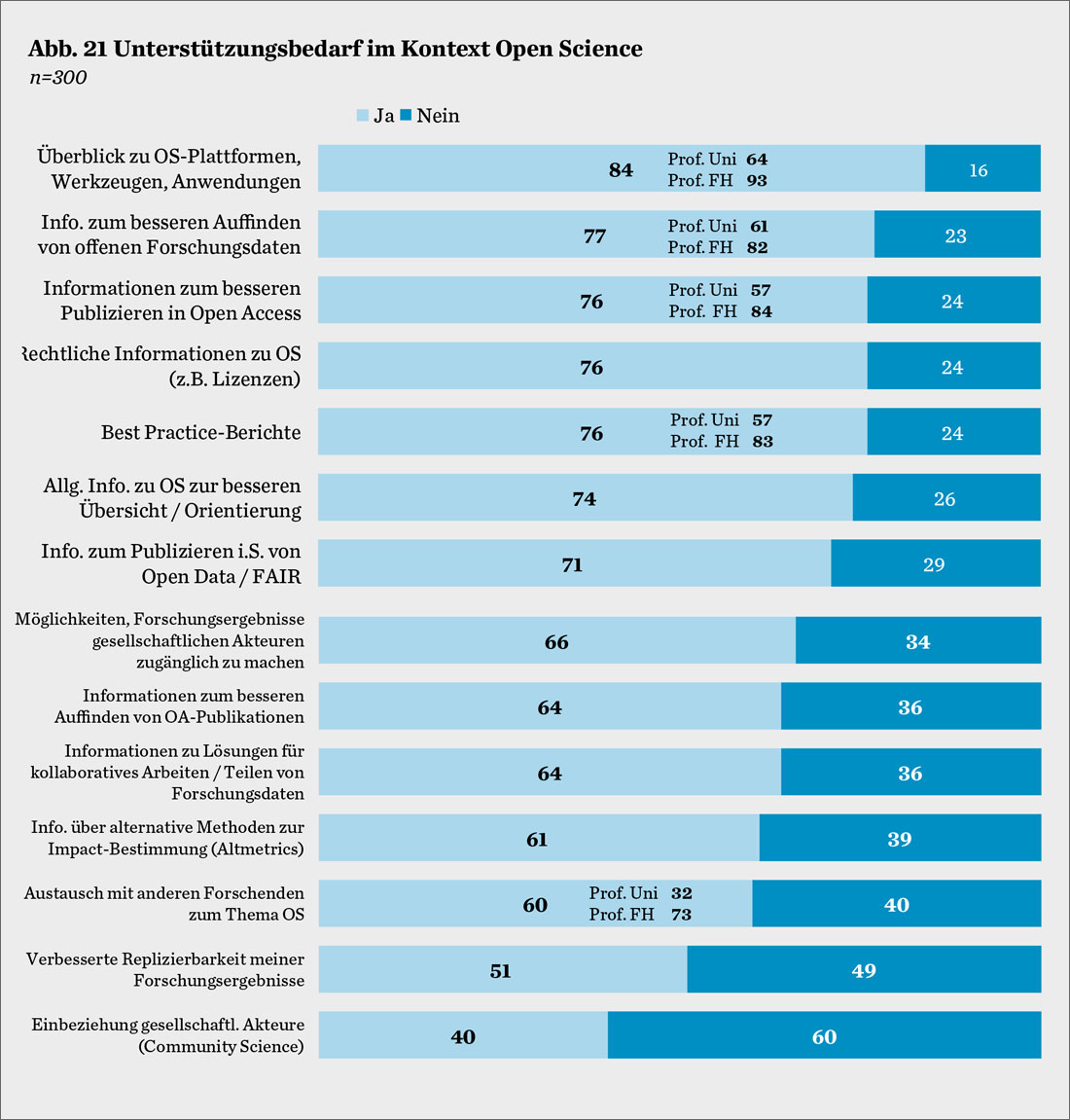
Libraries should start with the economists’ need for the support
The study shows economists have a strong interest in exploring open practices. Agreement with the principles is high. The most important aspect, from the libraries’ point of view, is that there is a high need for support. This also corresponds to the results of a workshop with economists “Open Science in Economics – From Politics to Practice” in the context of the study.
More action is needed here, to better address existing obstacles and communicate the benefits arising from the concrete application of Open Science in a more targeted way. In this context, the complexity of the topic must continue to be prised open and the respective concepts of Open Science should be explained better. Some answers in the study suggest, for example, that the understanding of the term differs to some extent. Individual aspects can be explored in more detail in further studies. The potential is there and the economists seem to be ready to increase the permeation of Open Science practices in economics.
Dr Guido Scherp is Head of the “Open-Science-Transfer” department at the ZBW – Leibniz Information Centre for Economics and Coordinator of the Leibniz Research Alliance Open Science. He can also be found on LinkedIn and Twitter.
Portrait: ZBW©, photographer: Sven Wied
Dr Doreen Siegfried is Head of Marketing and Public Relations. She can also be found on LinkedIn and Twitter.
Portrait: ZBW©
View Comments

Tips and Best Practices: How Libraries Digitise Their Learning Opportunities
Even if libraries are gradually reopening, it is still worthwhile to accelerate the...


